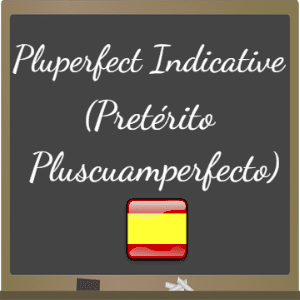The pluperfect indicative tense, literally the more than perfect, describes the past before the simple past. If two actions took place in the past, the one that occurred before is often described in the pluperfect indicative tense in Spanish. In case you encounter it in Spanish, the name of this tense is “el pretérito pluscuamperfecto.”
Table of Contents
- Conjugation in the Pluperfect Indicative (Pretérito Pluscuamperfecto)
- Examples
- Quiz: Pluperfect Indicative Tense in Spanish
- Level VI – Fluent
Conjugation in the Pluperfect Indicative (Pretérito Pluscuamperfecto)
| “Haber” in the imperfect + past participle |
The pluperfect indicative uses the verb “haber” in the imperfect. The conjugation of the pluperfect is as follows:
| -ar ending e.g., hablar | -er ending e.g., comer | -ir ending e.g., vivir | ||
| yo | había | hablado | comido | vivido |
| tú | habías | |||
| él/ella/usted | había | |||
| nosotros/-as | habíamos | |||
| vosotros/-as | habíais | |||
| ellos/ellas/ustedes | habían |
Examples
Here are some examples of the pluperfect indicative tense in Spanish:
| Antes de conocernos, nunca había ido a España. | Before we met, I had never been to Spain. |
| Cuando visité a mi mamá, mi hermana ya había llegado. | When I visited my mom, my sister had already arrived. |
| Después de que el partido había sido cancelado, los espectadores se fueron a casa. | After the game had been canceled, the spectators went home. |
Quiz: Pluperfect Indicative Tense in Spanish
Next: Pluperfect Subjunctive Tense
More lessons in Level VI:











